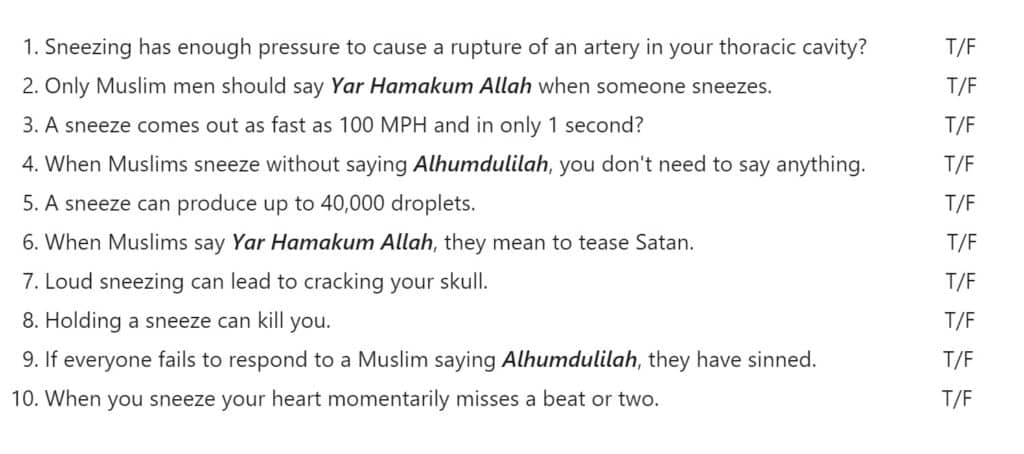In English, when sneezing, (Achoo!) anyone hearing you will respond by saying, ‘ (God) Bless You’ almost in a rhyming fashion.
However, when Muslims sneeze, a little conversation ensues between the person doing the sneezing and those hearing it.

So, What Do Muslims Say In Saudi Arabia When They Sneeze?
Or anywhere else in the world for that matter.
Immediately after Muslims sneeze, they say Alhamdulillah (الحمد لله) or ‘Thanks Be To God’. Other Muslims hearing these words reply with, Yar Hamakum Allah (يار همامكم الله) or ‘May God Forgive or Bless You.’ The sneezing person then adds, ‘Yahdeekum Allah Wa Yuslihu Baalakum’ (يهديكم الله ويصلح بالكم) which means ‘May Allah guide you and rectify your situation.’
As a new Muslim, I found this little sneezing ritual quite odd. I heard it everywhere I went and did not understand what Muslims were saying to each other and what it meant.
The following article explains the origin of this custom and why Muslims feel obliged to engage in this little dialogue each time they let out a sneeze.
Why Do Muslims Say Alhamdulillah When They Sneeze?
When Muslims sneeze, they are obliged to say Alhumdulileh and those around them to respond with Yar Hamaukum Allah.
The reason is that Muslims know very well a saying by Prophet Mohammed (SAW) that reads:
إِنَّ اللَّهَ يُحِبُّ الْعُطَاسَ وَيَكْرَهُ التَّثَاؤُبَ
“Verily, Allah likes sneezing and dislikes yawning.
Saheeh Bukhary, Book Of Manners, 5872
In this Hadith, Prophet Mohammed (SAW) says that it pleases Allah (SWT) when we sneeze. He further explains that the act of yawning is from the devil (Satan).
When Muslims yawn, we understand from Prophet Mohammed (SAW) that Satan is laughing and mocking us.

Muslims Sneeze To Gain The Pleasure Of Allah (SWT)
When Muslims sneeze, they will verbalize the words Alhamdulillah, or ‘Thanks Be To God’. The physical act of sneezing causes the entire body to shudder and possibly for the heart to stop.
For this forceful act of sneezing, we give thanks to Allah (SWT).
In this Hadith, Prophet Mohammed (SWT) then informs us:
كَانَ حَقًّا عَلَى كُلِّ مُسْلِمٍ سَمِعَهُ أَنْ يَقُولَ لَهُ يَرْحَمُكَ اللَّهُ
It is the duty of all Muslims to hear the words Alhamdulillah, ‘Thanks Be To God’ and to respond with Yar Hamakum Allah, ‘May God Forgive or Bless You.
Saheeh Bukhary, Book Of Manners, 5872
The Right of Muslims Upon Other Muslims When Sneezing
Muslims are obliged to respond to the sneezing person. It is the right of response or the notion of Tashmeet (تشميت) on the sneeze itself.
Tashmeet (تشميت) means an outward show or display of joy and delight at the affliction of another.
In this case, when Muslims sneeze, other Muslims hearing the utterance Alhamdulillah, reply with Yar Hamakum Allah as a way to show joy and delight and with the saying of Tashmeet (تشميت):
- The sneeze pleases Allah (SWT).
- The reply (Yar Hamakum Allah) teases, pains, and antagonizes Satan (Shaytan).
So Muslims say Yar Hamakum Allah to the person sneezing to acknowledge that the act of sneezing both pleases Allah (SWT) and that it annoys and drives the devil (Shaytan) crazy.
and Yar Hamakum Allah When Sneezing
What Is Sneezing?
Sneezing makes thousands of germs shoot out of the lungs and nose. It begins with an itch in the nasal cavity caused by intruding germs and irritants.
The nervous system responds to this viral/bacterial invasion by telling the brain to get the irritants out. The brain then instructs the nose to sneeze once, sometimes many times.
A release of histamines in the nose causes you to sneeze repeatedly until all the irritants leave the body. The debris shoots out of your nose at high speeds between 113 kph – 160 kph (70-100 mph).
Are There Any Medical Benefits To Sneezing?
A sneeze is a blessing in that it rids your body of the thousands of germs that would still be in your head, lungs, and body. They could easily make you sick and cause you lots of bodily pain.
A good sneeze gets rid of germs and brings immense relief.
In the act of sneezing, we say Alhamdulillah to give thanks to Allah (SWT) for the blessing that he has enabled the immune system in the human body to react and expel irritants and germs.
Sneezing is a sign of good health and functionality.
Does The Heart Really Stop When We Sneeze?
No!
When you sneeze, the heart does not stop, but the heartbeat does change momentarily to adjust to the decrease in blood flow back to the heart caused by the force of the sneeze.
This force results in a sudden increase in pressure in the thoracic cavity and around the thoracic wall. The cavity holds the heart, lungs, muscles, thymus gland, and internal structures are all affected.
However, Doctor Rutlen is a cardiologist at UAMS’s Department of Otolaryngology. He claimed that sneezing causes the heart to slow down and to ‘hold in place for several seconds.’
A vagal nerve maneuver causes this slow-down. It is a reaction in the nervous system and one that can control the heart.

Abu Hurayrah( RA) ba=narrated:
‘When Prophet Mohammed (SAW) sneezed,
Sunan Abi Dawud 5029
إِذَا عَطَسَ وَضَعَ يَدَهُ أَوْ ثَوْبَهُ عَلَى فِيهِ وَخَفَضَ أَوْ غَضَّ بِهَا صَوْتَهُ . شَكَّ يَحْيَى
He placed his hand or a garment on his mouth to lessen the noise.’
Jamiat Tirmidhi 2745
Classed as Hasan by Al-Albani
When A Muslim Does Not Say Alhamdulillah After Sneezing, Should Others Say Yar Hamakum Allah To Him/Her?
No!
When Muslims do not say Alhamdulillah after sneezing, it is no longer obligatory for others to reply with Yar Hamakum Allah.
In this case, you should remain silent.
The order to remain silent is because of the following Hadith (paraphrased):
One day, Prophet Mohammed (SWT) was sitting in the mosque where two companions (Sahabat) sneezed. The Prophet (SAW) turned to one of them and said Yar Hamakum Allah, and ignored the second.
This second man then approached Prophet Mohammed (SAW) to ask him why he had said Tashmeet (تشميت) to the first man who sneezed but ignored him (me). The Prophet (SWT) replied to the man that the first man had said Alhumdulileh after sneezing and that he (the second) had not.
Hadith
Should The Entire Group Of Muslims Say, Yar Hamakum Allah To A Sneezing Person?
Every Muslim who hears the sneeze is obliged to respond by saying Ya Hamakum Allah. However, if one person in the group says it, there is no need for the rest to repeat it.
If everyone in the group fails to respond to the sneezing person, then they all have sinned.
They have sinned because of the following Hadith:
Abu Hurayrah (RA) said: Prophet Mohammed (SAW) once said: “There are five things that the Muslim must do for his brother: returning the greeting of salaam, saying ‘Yar Hamauk Allah’ to one who sneezes.”
Narrated by Muslim (4022)
Should The Listener (s) Say Yar Hamakum Allah To A Muslim Who Sneezes And Says Alhamdulillah Four, Five Or More Times In A Row?
No!
If you hear Muslims sneezing and saying Alhamdulillah more than three times, there is no need to continue responding with Yar Hamamuk Allah.
After three consecutive sneezes, you should stop, say to him/her ‘You have a cold’ and only pray for his/her good health.
Ceasing to respond is because of several narrations reporting the testimony of Salamah ibn al-Akwa‘ (RA). He said of sneezing:
I (Salamah) was with Prophet Mohammed (SAW) when a man sneezed in his presence of the Prophet who said Yar Hamakum Allah three times. When he sneezed a fourth time, the Prophet (SAW) stopped saying it and then replied, ‘This man has a cold’’.
Salamah ibn al-Akwa‘ (RA)
For More Ahadith On Sneezing See Also:
- Shaiykh Ibn Taymiyah-Fatwaa Al Kubra 1-443
- Abdullah Ibn Abi Bakr -Al – Muwatta 1521
- Ibn Maajah 3704 (Saheeh- Al Baani)
- Shaeeh Muslim 4022
- Abu Dawood
- At Tirmidhi -Kitaab al-Adhkaar, 1-273
- An Nawawi
- Ibn Uthymeen-Liqa’ Al-Baab Al-Maftooh- 127
Test Yourself!
Sneezing Quiz-Answer True Or False


References And Useful Links
- Hadith on Manners: Allah Likes Sneezing & Dislikes Yawning
 -Abu Amin Elias
-Abu Amin Elias - Why Do Muslims Say Al hamdu Lillah After They Sneeze? -Shaikh Mohammed HUDA TV
- Sneezing, Science Behind The Veil – Inamuallah Khan MEDCrave
- Does Your Heart Stop For An Instant When You Sneeze?
 UAMS Health
UAMS Health - Thorax
 -Wikipedia
-Wikipedia - Sneezing And Saying Yar Hamamuk Allah
 -Islam Q&A
-Islam Q&A
